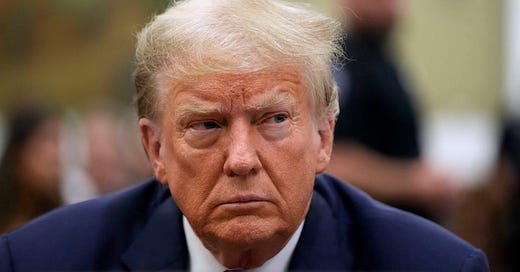Last week, Donald Trump’s announcement at a joint press conference with Benjamin Netanyahu exposed who truly controls the sausage-making factory in Washington.
Trump’s declaration that he intends to “take over Gaza” and displace more than 1.5 million Palestinians ignited widespread controversy, thrusting him into one of the world’s most contentious geopolitical conflicts.
While his statement was widely condemned as reckless and uninformed, it’s also shed light on the weaponisation of antisemitism and the failure of powerful institutions to hold him accountable for his comments.
Trump’s remarks lacked any clear policy framework or diplomatic rationale. Gaza, a densely populated Palestinian territory, has been at the heart of Israel’s occupation of Palestine for decades. His statement has been criticised as a dangerous oversimplification of a deeply complex issue. Yet, the implications extend beyond their surface-level absurdity—they raise critical questions about the misuse of the term “antisemitism” and the selective outrage of influential groups.
Antisemitism refers to prejudice, discrimination, or hostility directed at Jewish people as individuals or as a group. Trump’s announcement, however, doesn’t explicitly target Jewish people or invoke antisemitic tropes. Instead, it reflects his characteristic approach to foreign policy: brash, uninformed, and self-aggrandising.
While his statement isn’t antisemitic, it does perpetuate a dangerous narrative—one that disregards the sovereignty and humanity of the Palestinian people while reinforcing the idea that powerful figures can unilaterally dictate the fate of entire populations.
Although not explicitly antisemitic, his remarks have drawn criticism for their potential to inflame tensions in the region and undermine peace efforts. Many argue his rhetoric further marginalise Palestinian voices and emboldens extremist elements on both sides of the conflict.
The controversy surrounding his announcement emerges against a backdrop of growing concerns over the misuse and politicisation of antisemitism. In recent years, criticism of the Israeli government and Zionism has increasingly been characterised as antisemitic to silence dissent. The distortion and political manipulation weakens the fight against real antisemitism by stretching the term to encompass statements that bear little resemblance to actual prejudice or hatred toward Jewish people.
As a result, legitimate human rights concerns about Israeli policies are falsely labelled as antisemitic, creating a climate where genuine instances of antisemitism risk being taken less seriously.
One of the most striking aspects of the reaction to Trump’s announcement has been the relative silence of the Zionist lobby and other influential groups that are typically quick to condemn antisemitism. These organisations, which historically aligned with Trump due to his pro-Israel policies, have largely refrained from criticising his remarks.
The selective outrage underscores the politicisation of antisemitism and raises serious questions about whose voices are prioritized in discussions of Jewish identity and safety. By failing to call out Trump’s reckless rhetoric, these groups risk further eroding the credibility of the term “antisemitism” and alienating those who seek to combat it in good faith.
The Zionist lobby’s silence on holding Trump accountable reinforces a growing realisation: the term “antisemitic” has been weaponised to instil fear in those who challenge Israeli policies and their supporters.
Trump’s statement isn’t antisemitic, but it is a clear reminder of the dangers of reckless rhetoric and the politicisation of antisemitism.
The failure of the Zionist lobby and other influential groups to condemn Trump’s statement reveals their true priorities—demonstrating that their outrage isn’t rooted in a genuine concern for antisemitism, but in a broader political agenda designed to suppress criticism of Israel.
If their concern were truly about combating antisemitism, Trump would have been relentlessly condemned. Instead, their silence confirms what many have long suspected: antisemitism has been manipulated as a political tool, shielding Israel from scrutiny while silencing those who speak out against its actions.
The world cannot afford to remain silent in the face of Trump’s reckless rhetoric, nor should it continue to tolerate the weaponization of antisemitism to stifle legitimate criticism of Zionism and Israel’s policies. The selective outrage—or lack of it—exposes the hypocrisy of those who claim to safeguard Jewish safety yet turn a blind eye when political alliances take precedence over principle.
Trump, in all his recklessness, has inadvertently revealed an inconvenient truth: the fight against antisemitism has been hijacked by those who exploit it for political gain.
It’s time to reclaim that fight. Genuine antisemitism must be confronted wherever it appears, but it should never be used as a shield to silence discussions about human rights, occupation, and the oppression of the Palestinian people.





I won't be as diplomatic as the other are on here. Fuck occur imbecile. You are a fool adhering to a narrative that is not only a lie but a projection of all and everything that Israel has ever enacted or wish to enact or will inevitably enact on the Palestinians should you be allowed to get your way and continue. You are a battery operated zombie incapable of free thought or intellect dual reasoning. A dog is what you are!
Here's a concise summary of your thoughts Lenny and you're 100% right. It's hard to be anti-semitic towards people from eastern Europe who aren't semites. But unfortunately the brainwashed and ill-informed seem to think it is!